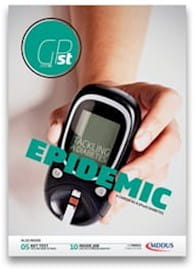DAY ONE
Mrs P attends the GP surgery along with her 11-year-old son Noah. Her regular family doctor is on holiday so she is seen by Dr L. Noah has a very sore throat and is also complaining of headaches and feeling “tired all the time”. Dr L examines Noah’s throat and records: “Inflamed tonsils; white sloughs”. The GP diagnoses tonsillitis and prescribes erythromycin rather than the usual first choice of a penicillin, as Noah had been taking co-amoxiclav five weeks earlier for a chest infection. In addition she issues a prescription for amphotericin lozenges just in case there is a co-existing fungal infection secondary to the recent use of antibiotics. No other symptoms or concerns are mentioned in the patient notes.
DAY FIVE
Noah arrives in A&E with his parents who report he has been feeling sick and dizzy for two weeks and his weight has dropped half a stone in a month. Noah also claims to be almost constantly thirsty and needing the toilet. On examination Noah is found to be very unwell with significant dehydration and a blood test shows he is hyperglycaemic. A diagnosis of diabetic ketoacidosis is made and Noah is started on IV insulin and rehydration.
DAY SEVEN
Noah is transferred to a paediatric nephrology unit having developed acute renal failure and hypertension. He undergoes two sessions of haemodialysis and there are worries he may have developed renal papillary necrosis. Noah spends another week in hospital before being discharged home, with his kidneys having recovered sufficient renal function.
MONTH SIX
Noah attends a paediatric nephrology clinic and tests indicate his renal function is back to normal. An earlier ultrasound of his kidneys has found no sign of lasting damage. He is discharged from renal follow-up.
SEVEN months later Dr L receives a letter of claim from solicitors acting on behalf of Noah and his parents alleging clinical negligence for failing to investigate and diagnose his diabetes and thus preventing acute renal failure secondary to ketoacidosis. This resulted in the boy having to undergo haemodialysis.
In the letter of claim it is alleged by Mrs P that during the consultation she alerted Dr L to Noah’s recent weight loss and his persistent thirst. In addition she claims to have brought a sample of Noah’s urine to the surgery “reasonably thinking it would need to be tested”. None of this is recorded in the patient notes.
The letter also highlights the fact that Dr L had diagnosed oral thrush as evidenced by her prescription for amphotericin lozenges. Oral thrush is rare in children and it is claimed that this should have alerted Dr L to the possibility of a significant underlying disorder. Given the combination of symptoms, not considering a diagnosis of juvenile diabetes and ordering tests to confirm this constituted a serious breach of duty.
The letter concludes that had simple diagnostic tests been carried out to detect either high glucose levels or the presence of ketones, Noah would have been quickly admitted to hospital with intravenous treatment and insulin therapy. This would have avoided the later renal complications.
Dr L contacts MDDUS for assistance. In her letter of response to the allegations she claims that Mrs P had made no mention of weight loss or thirst during the original consultation. Nor did she bring a urine sample as it would certainly have been tested given the symptoms described. Dr L claims she was only aware of symptoms suggestive of an upper respiratory infection.
MDDUS commissions an opinion from a GP expert. In considering only those facts recorded in the patient notes, the expert judges that Dr L’s management of Noah was in accordance with acceptable standards – although he does acknowledge that oral thrush is rare in children. But he adds: “If the claimant’s version of events is accepted, the symptoms were so typical of diabetes that Dr L’s failure to further investigate would constitute care well below what would be acceptable in a competent general practitioner”. The case is clearly one of the family’s word against that of the doctor.
Examining all the facts of the case MDDUS lawyers judge that there is a reasonable risk that a court could decide to accept the claimant’s version of events. It is decided that the offer of a small settlement with no admission of liability is the most prudent course given the potential cost of a protracted legal battle. Dr L agrees and the case is settled.
KEY POINTS
• Good records provide the best defence – but sometimes not even this is enough.
• MDDUS must take a pragmatic approach when deciding how best to proceed in negligence claims – balancing all interests.
This page was correct at the time of publication. Any guidance is intended as general guidance for members only. If you are a member and need specific advice relating to your own circumstances, please contact one of our advisers.
Read more from this issue of Insight Primary

Save this article
Save this article to a list of favourite articles which members can access in their account.
Save to library


